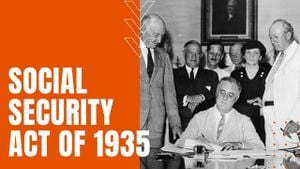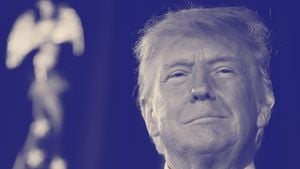With the 2024 presidential election results just rolling in, conversations surrounding media bias and its apparent effect on voter behavior have sparked considerable discourse across the nation. One theme echoing through various platforms is the sentiment among some voters, particularly younger demographics, who accuse mainstream media of tarnishing the reputation of former President Donald Trump, even before the ballots were cast.
According to focus group discussions highlighted by The New York Times, many undecided voters, especially those who might have leaned Democrat, expressed frustration and felt swayed by what they perceive as media bias. A participant named Joseph, age 24, echoed sentiments shared among the group when he pointed out how “the mainstream media was carrying Kamala Harris’s water.” His comments signified the type of frustration shared by numerous voters who felt disenfranchised by what they interpret to be skewed reporting.
This general frustration is not isolated. It points toward broader concerns about the integrity of the information being disseminated, and how it could skew public perception and influence voting decisions. Virginia resident Abigail, 23, remarked on the perception of media's role in shaping narratives detrimental to Trump's image, noting, "There was the misleading story about Trump and Liz Cheney. That just goes to show you how the media can manipulate facts."
Interestingly, the participants’ discussions revealed contradictions among those who identified as undecided voters or even potential Biden voters from 2020. Many admitted their shift toward Trump, reflecting on how media portrayal contributed significantly to their decision-making process. For some, the outright gushing from media personalities about Harris’s campaign contrasted sharply with the coverage Trump received, which they deemed excessively harsh.
According to voter Lillian, who had voted for Trump back in 2020, the sheer volume of media backlash against him had acted as the perfect counterpoint to his strategy. Lillian articulated how observing media opposition to Trump dynamically shifted her perspective, stating, "Seeing how triggered the media got made me want to support him even more." This pattern of opposition fueling support is not uncommon, as many voters feel directly influenced by how candidates are perceived through media narratives.
Fox News also reported on changes in voter attitudes post-election. Media figures often exuded high praise for Kamala Harris’s campaign approach, branding it as "flawless" and "incredible," even though her electoral results told a different story. Such stark contrasts didn’t go unnoticed among voters who felt their sentiments were disregarded. Georgia’s student George, 21, underscored the concept of double standards, pointing out how certain quotes by Biden, like his infamous "garbage" comment, felt “glossed over” by media outlets.
This entire situation escalated when actress Patricia Heaton, known for her roles on Everybody Loves Raymond and The Middle, publicly condemned the media for perpetuating fear tactics during the 2024 election season. Heaton passionately criticized media narratives surrounding women's issues, particularly anti-abortion laws, asserting, "Shame on you! You targeted vulnerable people." Her remarks highlighted how significant segments of the electorate, particularly women, respond intensely to media portrayals of policies and elections, feeling alarmed by perceptions of what’s at stake.
Heaton’s rebuttal is just one example of shifting narratives and the anxious climate following the elections. Many women have taken to social media, posting expressive reactions like shaving their heads or other dramatic displays. This emotional distress can sometimes stem from how narratives are pitched to them, indicating just how deeply personal and intense these comments are.
The reactionary nature of voter sentiment is compelling yet troubling, as it signifies the potential for news coverage to create hyperbolic fears among citizens about their representatives. Consequently, voters have been left grappling with how they interpret these messages against their beliefs. Heaton also emphasized the need for the media to be more responsible and sensitive, stating, "Quit dismissing people who feel differently from you... Learn your lesson on this." Her commentary reinforces the notion of responsibility and ethics within journalism.
And the reactions haven’t stopped there. After the election results came pouring in, many commentators continued to revise and critique the political media's performance before and during the elections. Former media professionals voiced concerns over how narratives were crafted and manipulated. For example, ex-CNN staff members have vocally denounced the hyperbolic tropes often circulated about Trump and his candidacy, claiming the “end of democracy” rhetoric could lead to significant credibility issues for reporters.
The examination of media bias extends beyond just the political scene, touching the very fabric of electoral participation and public discourse. For some analysts, it raises broader questions about the role of journalism. Are they merely reporting on what happens, or are they actively influencing how voters make up their minds? The dialogues around these questions are heated and dynamic, shaping the conversations citizens have about their democratic process. Many young voters currently feel they have been exposed to blatant biases both on the right and left—making the already confusing political climate even more challenging to navigate.
Returning to the youth angle, one cannot help but notice how their voices have emerged at the forefront of changing political landscapes. Gen Z voters who previously might have leaned toward liberalism are questioning previous allegiances as they witness what they describe as disproportionate treatment from traditional media sources. This generation craves authenticity and integrity, seeking transparent sources. They seem willing to change party lines when they feel disillusioned, often driven by the media's portrayal of candidates.
Despite the clear divisions and swirling tensions, one thing remains certain: the interaction between media representations and voter sentiments will continue to shape political conversations. It begs the questions of whether the media has learned anything from this recent past, particularly with their focus on creating more equitable narratives. Many voters, now more than ever, crave authenticity, wanting beyond all else to know they are heard and understood. The media’s influence on public sentiment won’t diminish but rather evolve as political tides shift and new campaigns arise.
The post-election period promises to be just as filled with reflection and reaction, as pundits and everyday citizens engage with the complex task of seeking clarity amid controversy. It’s clear the dialogue surrounding media bias, public perception, and voter influence has only just begun.



